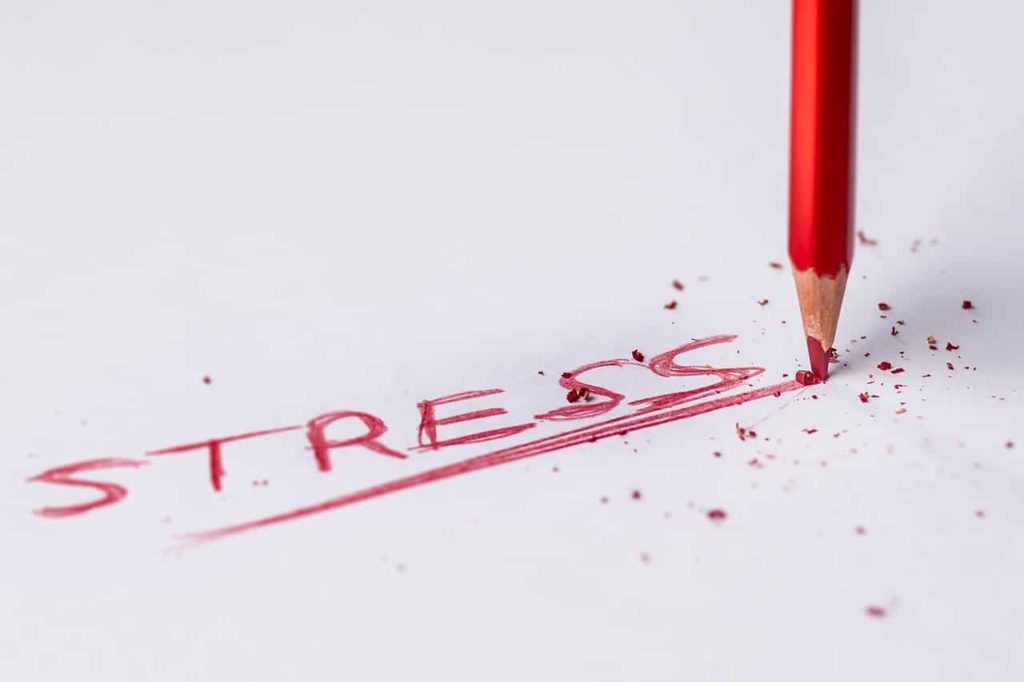Stress is one of the most dangerous reactions we can have as humans. Our bodies react to stress the same way it would to an immediate threat, such as being chased in a way that means you have to run for your life or having to face a threat and fight for your life. This may seem drastic, but it’s precisely how the human body reacts to extreme stress – but did you know stress can also cause weight gain? Take a minute to learn how stress affects your weight and what you can do about it, so you win the battle between stress and the bulge.
Studies: Effect of Stress on Obesity
Stress causes chronic effects with mental, physical, and social stressors causing changes in dietary preferences, foods consumed, and distribution of fat tissue. Mainly, increased stress causes us to make poor food choices, eat more than we need, and store fat around the midsection. (Current Obesity Reports, 2012)
Further research shares that “stress may play a major role in the development and maintenance of obesity…” The focus appears to be on the hormone cortisol. Increased levels of cortisol cause an increased collection of abdominal fat. If you have chronic stress, you may be storing extra fat in your midsection. (Current Obesity Reports, 2018)
Obesity itself also plays a circular role in weight gain. Obesity causes a chronic state of inflammation and oxidative stress. These factors directly impact overall health and wellness. During obesity, chronic stress is linked to the storage of visceral fat on the abdomen, which causes more stress and more fat storage – and the cycle continues. (Scientifica, 2012)
You can find support, resources and tools to help you lose weight for the last time with Noom.
How does stress cause us to gain weight and stay obese? It appears that the body’s metabolism is affected. This includes how food is processed and nutrients absorbed. This is yet another connection between stress and weight gain. (Psychology Today, 2016)
To sum it up: Obesity causes a chronic state of inflammation and stress and stress causes weight gain. Basically, increased release of cortisol, “over several months is associated with people being more heavily, and more persistently, overweight.” (ScienceDaily, 2017)
Stress and Survival Mode
Taking a closer look at stress and weight gain, we find that the human stress response – the one that’s integrated into our genetic makeup, could be one of the direct causes of obesity. Basically, as the body reacts to stress of all kinds, including stress at work, environmental stress, and personal stress at home. The reaction causes a flood of stress hormones that cause muscles to tense up, and the heart rate to increase. This “fight or flight” response is completely normal, but in a world where stressors are present every day, being in a constant state of “fight or flight” begins to cause health problems, including weight gain.

Affects Cortisol Levels
Touching on cortisol levels for a moment, we can see even more clearly how stress affects weight gain. Along with promoting storage of abdominal fat, increased levels of cortisol can cause inflammation and pain. Pain, of course, creates a stress response, in many cases, so you can see how stress, cortisol, and weight gain are connected.
To put it plainly, “cortisol may…factor [in] the development of central obesity” and cortisol levels increase with stress, especially mental stress. (Metabolic Syndromes and Related Disorders, 2005)
Slows Metabolism, Increases the Risk of Obesity
One of the symptoms of a metabolic disorder is inflammation and reduced metabolic function. When metabolic function slows, you burn fewer calories and store the remaining calories as abdominal fat – again with the cortisol connection. (Current Opinion in Clinical Nutrition and Metabolic Care, 2004)
Another natural body reaction to stress is the release of betatrophin – a protein that directly affects the breakdown of fat. As the metabolism of fat is disrupted, fat levels increase, and weight gain occurs. (Islets, 2014)
Increases Cravings for Poor Food Choices
Going back to the point of social and physical stress and poor food choices, we can see that eating right is definitely tricky when facing stress. In the innermost parts of the brain, stress causes an increase in reward sensitivity. Reward sensitivity connects food to pleasure, so you feel better when you eat certain foods. Stress is also associated with an increased risk of using addictive substances, of which food is one. (Minerva Endocrinology, 2014)
There’s also clinical proof that stress causes increased food cravings, again leading to an increase in calorie intake and weight gain. (Journal of Health Psychology, 2018)

You can keep track of your food choices using the extensive food database offered by Noom. The database is managed by nutritionists and currently has more than 3.7 million food choices.
May Cause Difficulty Sleeping
Even in the beginning years of adulthood, stress plays a critical role in sleep patterns, which directly influence food intake. In college students, research has shown that stress causes problems with sleep, but it’s the reaction to the stress that plays a critical part in your body’s response to said stress. Basically, if you can control your stress response, you can reduce the adverse effects of stress on weight gain. (Perceptual and Motor Skills, 1999)
On a molecular level, sleep deprivation causes a desire for certain foods, and, as a result, men and women tend to eat the majority of their daily calorie needs in the first meal of the day. That leaves little for other meals and, thus, facilitates overeating and weight gain. (NIH, 2016)
Natural Methods of Fighting Stress
Now that we know how stress affects weight, how can we battle this “fight or flight” stress reaction and increased levels of cortisol? You can reduce the impacts of stress on weight using methods such as exercise, meditation, mindfulness, yoga, progressive muscle relaxation, and a reliable support system.
Exercise
In addition to seeking help from professionals focused on how to deal with stress, exercise can be used to relieve stress, and as such, reduce the impact of stress on weight. (ACSMs Health & Fitness Journal, 2013)
It is estimated that only 14% of the population currently uses exercise to alleviate stress. Taking into consideration the positive effects of exercise on body weight, bone mass, and other health issues, exercise may relieve stress, but it also offers many other benefits. For instance, it also helps fight the effects of obesity on the body. (Anxiety and Depression Association of America)
Practice Meditation and Mindfulness
Mindfulness is huge in the fight against stress and weight gain. When you meditate and grow more and more mindful of the decisions you make, you’ll notice changes in your stress reactions and, indirectly, eating patterns. Mindfulness meditation also reduces cortisol levels, so you’re fighting that abdominal fat as well. (Stress & Health, 2005)

Practice Yoga
Along the same line as meditation and mindfulness is yoga. Yoga is a method of exercise that’s centered on your mental connection to your body and the world around you. Research has shown that practicing yoga, even if you’ve never practiced yoga before, can decrease stress levels by nearly 15%. Imagine the impact of stacking these stress relievers on top of one another – the result is reduced stress and reduced weight gain. (Perceptual and Motor Skills, 2009)
Psychologists and mood professionals claim that yoga, including breathing exercises and meditation, can promote stress relief. (Psychology Today, 2015)
Yoga practice takes time to learn. As you are exercising to reduce stress, and essentially weight gain, partner your new healthy lifestyle changes with a tracking system, like Noom, that can show you where you started with yoga and where you are today.
Learn Progressive Muscle Relaxation
Progressive muscle relaxation may be a new term – so let’s discover it together. When you tense your muscles gradually and release those muscles gently, it can alleviate stress – and, inevitably, the body’s stress response, including the release of cortisol. After training on muscle relaxation, participants in one study reported reduced stress. The effects lasted a minimum of 10 weeks (when the participants checked in for the last time). (The International Journal of Aging and Human Development, 1982)
Though this research was completed many years ago, the role of progressive muscle relaxation remains solid and supported by clinical study to this day. To practice, “progressive muscle relaxation, you tense a group of muscles as you breathe in, and you relax them as you breathe out. When your body is physically relaxed, you cannot feel anxious.” Less anxiety means less stress, and less stress can lead to weight loss and prevention of weight gain. (Michigan Medicine)
Lean on Your Support System
The social support we have at home, and in life, plays an influential role in stress and weight gain. Social support tends to hold stress in check because you have people around you that are there when you need assistance and a helping talk with others who’ve fought the same battle of stress and weight gain. (Psychiatry MMC, 2007)
Mood also plays a role in stress, and indirectly, weight gain. Often, when in a depressed state, food choices go awry, and people choose meals that tend to be high in calories from simple sources, like sugar and white flour, that offer no nutritional value. Combating stress via social support can ease the connection, so you eat better, feel less stress, and find a support system to help stop stress and weight gain. (International Journal of Mental Health Systems, 2014)
One of the best support systems we’ve found to help with problems like stress and weight gain, comes with the app Noom. Noom comes with an active, supportive virtual community made up of experts and people like you fighting the weight-loss battle.
To sum it up: Relaxation techniques help by slowing your heart, lowering BP, promoting sleep quality, reducing tension and pain, and reducing frustration and anger. These are all symptoms of increased stress.
Now that you know how stress affects weight gain and how to fight stress to reduce the impact on weight, how can you tell what stress looks or feels like?
Recognize Warning Signs of Stress
Signs of emotional and physical stress may include reduced energy, unclear mind, feeling edgy, poor eating habits, and trouble sleeping. From there, symptoms occur. These include digestive problems, diarrhea, headaches, and weight gain. (Cleveland Clinic)
Other common signs and symptoms of stress include:
- Nightmares
- Trembling hands
- Sweating or blushing
- Increased urination
- Mood swings
- Difficulty learning and storing new information
- Reduced sex drive
- No interest in physical appearance
As you can tell, the signs and symptoms of stress are profound, and some may overlap with certain health and mental conditions, but then again, stress and mental health are directly connected.
When feeling the signs and symptoms of stress, keep in mind that many overlap with mood issues. It may be best to seek attention from a healthcare provider who may be able to help you reduce stress and work with you to control mood so you can live your best life.
Now, we know that stress and weight gain are connected on a physical and emotional level. Fighting the signs and symptoms of stress looks different from one person to the next. Remember, track your moods, energy levels, food intake, and exercise with an app like Noom to keep you on track even when times get tough.
Article Sources
- https://www.ncbi.nlm.nih.gov/pmc/articles/PMC3428710/
- https://www.ncbi.nlm.nih.gov/pmc/articles/PMC5958156/
- https://www.ncbi.nlm.nih.gov/pubmed/24278677
- https://noom.8utb.net/c/1720052/500038/8591
- https://www.psychologytoday.com/us/blog/media-spotlight/201610/are-stress-and-obesity-related
- https://www.sciencedaily.com/releases/2017/02/170223092342.htm
- https://www.ncbi.nlm.nih.gov/pubmed/18370704
- https://www.ncbi.nlm.nih.gov/pubmed/15075708
- https://www.ncbi.nlm.nih.gov/pmc/articles/PMC4594198/
- https://www.ncbi.nlm.nih.gov/pmc/articles/PMC4214609/
- https://www.ncbi.nlm.nih.gov/pmc/articles/PMC6186388/
- https://noom.8utb.net/c/1720052/500038/8591
- https://www.ncbi.nlm.nih.gov/pubmed/10407896
- https://www.nih.gov/news-events/nih-research-matters/molecular-ties-between-lack-sleep-weight-gain
- https://journals.lww.com/acsm-healthfitness/fulltext/2013/05000/STRESS_RELIEF__The_Role_of_Exercise_in_Stress.6.aspx
- https://adaa.org/understanding-anxiety/related-illnesses/other-related-conditions/stress/physical-activity-reduces-st
- https://onlinelibrary.wiley.com/doi/abs/10.1002/smi.1062
- https://www.ncbi.nlm.nih.gov/pubmed/20178291
- https://www.psychologytoday.com/us/blog/urban-survival/201512/yoga-stress-relief
- https://noom.8utb.net/c/1720052/500038/8591
- https://www.ncbi.nlm.nih.gov/pubmed/7345035
- https://www.uofmhealth.org/health-library/uz2225
- https://www.ncbi.nlm.nih.gov/pmc/articles/PMC2921311/
- https://www.ncbi.nlm.nih.gov/pmc/articles/PMC4242489/
- https://noom.8utb.net/c/1720052/500038/8591
- https://my.clevelandclinic.org/health/symptoms/6406-warning-signs-of-emotional-stress-when-to-see-your-doctor


